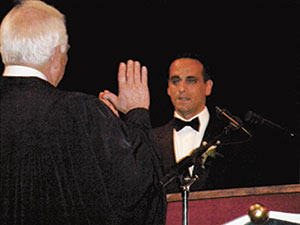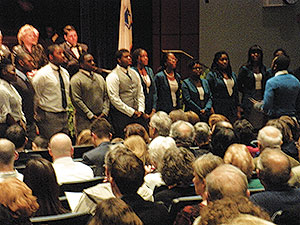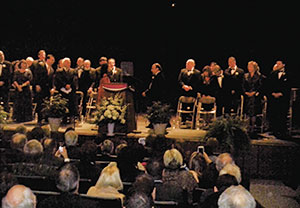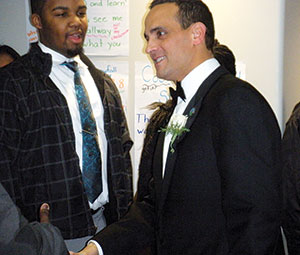
Somerville District Court Presiding Justice Maurice K. Flynn III swears-in Mayor Joseph Curtatone for his sixth term Monday evening, making him the longest-serving mayor in the city’s history. – Photos by David R. Smith
By David R. Smith
The East Somerville Community School played host to the city’s annual inaugural ceremonies Monday evening, during which Mayor Joseph Curtatone and members of the Board of Aldermen and School Committees were officially sworn-in to their terms by Maurice K. Flynn III, the presiding justice of the Somerville District Court. While the inauguration is nothing new, this year’s event saw Curtatone being sworn in to an unprecedented sixth term and five seats on the 11-member board being filled by new people.
The music provided by a string quartet in the hallway outside the auditorium prior to the ceremony was carried into the auditorium courtesy of Somerville High School senior Francesca Zimmerman, who performed the National Anthem, as well as a two-song performance by the Haitian Holy Baptist Church Choir.
The solemnity of the occasion, which, in addition to the music, included the posting of colors by members of the Somerville police and fire department honor guards and an invocation by Rev. Justin Hildebrandt, the lead pastor of Connexion (UMC) Somerville, was punctuated by moments of humor by both the elected officials who spoke to the standing-room-only auditorium and by Master of Ceremonies Pauline Lim, an artist who has called Somerville home for 25 years.

The Haitian Holy Baptist Bible Church Choir performed during Monday’s inauguration.
Although describing herself as a “goofball” who found it “frankly surreal” that she was asked to host the ceremonies, Lim is an established and accomplished artist and Harvard graduate whose credentials include being named president of the Brickbottom Artists Association. She credited Curtatone, who she referred to as “Mayor Joe” and Ward 2 Alderman Maryann Heuston for their contributions to revitalizing the Brickbottom area, where she lives and work. She went on to note that the same spirit of cooperation and rejuvenation has clearly extended to other parts of the city, such as Union Square.
“It’s exciting to be within walking distance of such a happening place,” she said, “and we’re all within walking distance of it.” She went on to note that East Somerville, where the inauguration was held, was also receiving some long overdue attention.
The joint effort between residents and town officials to reverse decades of bad developments have gone a long way towards bringing Somerville from where it was when it was described, in her words, as “’funky’ in the bad way.”
“Let us continue to be a city of makers,” she said.
The change for the better Lim felt is taking place throughout the city has to do with more than just new restaurants and updating infrastructure, according to School Committee Chairperson Christine Theberge Rafal.
“We aren’t just about pumping out test scores,” she said. “Our goal is balancing tried-and-true practices and bold innovations. A whole and happy community needs whole and happy youths.”
That theme of strengthening Somerville’s sense of community, a common thread throughout the evening’s speeches, was picked up by Board of Alderman Chairman Bill White, who said the decisions facing the city now would be felt for decades to come.
“There is a real distinction between a city and a community,” he said.

Board of Alderman President Bill White approaches the lectern during Monday night’s inauguration ceremony hosted by artist Pauline Lim (at lectern). The School Committee is seated to the left of the stage and the mayor and Board of Aldermen to the right.
He referenced 2010 U.S. Census figures showing an overwhelming number of respondents, 76 percent, had not lived in their homes for more than a year, as well as a 30 percent drop in the number of school-age children in the city from 2000 to 2010.
He called for more two- and three-bedroom housing units for parents who do not want to leave the city but are often forced to as their families grow. And while he pointed to the growth the city has seen since the ‘90s, he said continued development should be undertaken with an eye towards the future.
“Those buildings and construction will live on long after us,” he said.
In addition to careful planning, he said cultivating a real sense of community among residents “falls on us all.”
Like those who spoke before him, Curtatone reflected on the city’s history as a place where multiculturalism and diversity were everyday facts of life long before the terms were in use or the idea of diversity was seen as something to strive for.
He reflected on his and his family’s history in the city, as well as his experience growing up of hearing continents of languages just by walking a block down the street.
“My story is your story,” he said. “It’s Somerville’s story.”
He recounted improvements to the city since taking office a decade ago, which includes making the Green Line Extension a reality, the soon-to-come Orange Line stop at Assembly Square, plans to bring McGrath Highway down to street level at the McCarthy overpass and the city’s passage of the Community Preservation Act. He also pointed to creation of a 20-year comprehensive plan for the city, a lower crime rate and solid bond ratings as evidence of the city’s turn around. All of those, he said, would not have happened without the support of individual residents, city boards and committee and community organizations.
“I am not alone when it comes to providing a voice for the ambition and aspirations of this city,” he said.
He also noted that Somerville has gained attention on both the local and national stage, whether by being named as the best-run city in the state by the Boston Globe or being ranked the seventh most walkable city in the entire country.

Mayor Joseph Curtatone had no shortage of well-wishers prior to his inauguration at the East Somerville Community School
Monday night.
“We are a city others look to because we lead the way,” he said.
He presented a list of areas still in need of attention and improvement. He cited the need for more affordable housing, job-training programs and investments in education and public health as top priorities. He also said he wants to implement a community budgeting process, curbside trash collection, a ban on plastic shopping bags as other cities have done, as well as seeing the city’s retirement program divest from investments linked to fossil fuel production (and have the city reach a zero percent carbon emissions rate by 2050). He would also like to make more city data easily available to the public and strengthen the city’s ethics ordinance so that it goes well beyond the state’s standards.
Pointing to both past accomplishments and future goals, Curtatone expressed confidence in the ability of the city to do whatever it sets its collective mind to.
“We decided to control our own destiny, and we did,” he said, adding, “We are special today for the same reason we were generations ago: our people.”
.















Reader Comments